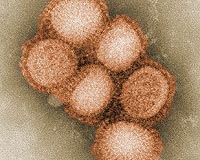| . |  |
. |
Washington (AFP) Sept 15, 2009 US drug regulators approved a swine flu vaccine on Tuesday, keeping officials on track to begin a mass vaccination campaign by next month, Health Secretary Kathleen Sebelius said. "I am pleased to report that today, the Food and Drug Administration (FDA) has approved applications for vaccine for the 2009 H1N1 virus for four of the (five) manufacturers of the US licensed seasonal influenza vaccine," Sebelius told US lawmakers. FDA Commissioner Margaret Hamburg welcomed the approval in a statement. "Today's approval is good news for our nation's response to the 2009 H1N1 influenza virus," she said. "This vaccine will help protect individuals from serious illness and death from influenza." The vaccine treatments are produced by CSL Limited, MedImmune LLC, Novartis Vaccines and Diagnostics Limited, and Sanofi Pasteur Inc, and the FDA said all four firms use the same processes. The US government has purchased 195 million doses of swine flu vaccine and will make shots against the influenza A(H1N1) virus available free of charge starting next month, Sebelius said, although providers might charge a fee to administer them. "The large-scale 2009 H1N1 vaccine program will begin mid-October with small amounts of vaccine becoming available the first week of October," she said. The fifth US manufacturer was also expected to be licensed, she added. Preliminary data from clinical studies showed the approved vaccines "induce a robust immune response in most healthy adults eight to 10 days after a single dose," the FDA said, noting that clinical studies underway would determine the best dose for children. Vaccination will be on a voluntary basis, with priority given to five groups deemed to be at particular risk from the novel swine flu virus. The US Centers for Disease Control and Prevention (CDC) has recommended that pregnant women, people in contact with infants, medical personnel, people aged six months to 24 years and adults under the age of 65 with underlying medical conditions should be the first to get the shots. That is about 160 million people in the United States -- less than the 195 million doses of vaccine purchased by the government, only about one third of which are expected to be ready by October. The vaccine will be available as either a flu shot made with dead A(H1N1) virus, or as a nasal spray made with live, weakened virus, Sebelius said. Clinical trials are underway to determine if there is "any harm" in having a seasonal flu vaccine -- which is already available -- at the same time as the vaccine against influenza A(H1N1), Sebelius said. Share This Article With Planet Earth
Related Links Epidemics on Earth - Bird Flu, HIV/AIDS, Ebola
 Some swine flu victims contagious 8 days or more: studies
Some swine flu victims contagious 8 days or more: studiesSan Francisco (AFP) Sept 15, 2009 Some swine flu victims remain contagious more than eight days after their symptoms have vanished, much longer than expected, said two studies presented at a meeting of experts. Currently, US health authorities recommend that people who contract the A(H1N1) virus wait 24 hours after the fever has subsided before returning to their normal activities to avoid any risk of spreading the disease. ... read more |
|
| The content herein, unless otherwise known to be public domain, are Copyright 1995-2009 - SpaceDaily. AFP and UPI Wire Stories are copyright Agence France-Presse and United Press International. ESA Portal Reports are copyright European Space Agency. All NASA sourced material is public domain. Additional copyrights may apply in whole or part to other bona fide parties. Advertising does not imply endorsement,agreement or approval of any opinions, statements or information provided by SpaceDaily on any Web page published or hosted by SpaceDaily. Privacy Statement |